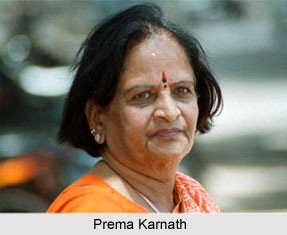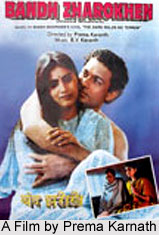 Prema Karnath is a graduate from the National School of Drama, New Delhi. While talking about Kannada films it is impossible not to mention her name. Her name is a popular one in the domain of Kannada cinema. Right from her young age she had the knack to make it big in the film industry and people recognize her through her grand quality of work that she has produced.
Prema Karnath is a graduate from the National School of Drama, New Delhi. While talking about Kannada films it is impossible not to mention her name. Her name is a popular one in the domain of Kannada cinema. Right from her young age she had the knack to make it big in the film industry and people recognize her through her grand quality of work that she has produced.
Early Life of Prema Karnath
Prema Karanth was born to a poor family, Bhadravathi, at in the year 1936. Her father, Devoji Rao, died when she was very young. Her mother Kamalamma, had tuberculosis and died pretty soon and thereafter she was raised by her grandparents. Prema spent her initial life at Sidlaghatta in the Kolar district. After completing her school education, she became a teacher at St. Teresa`s convent in Bengaluru. While working as a teacher, Prema also started conducting small time stage plays in the schools she worked in. Though initially, she was not sure of marriage, but soon that changed once she met B. V. Karanth at a friend`s place. In 1958, they got married under Arya Samaj rites and moved to Varanasi, where Prema, in order to continue her education, joined the Banaras Hindu University. Later B. V. Karanth moved to the national capital, Delhi, to join the National School of Drama. Prema too accompanied him and joined the Aurobindo Ashram as a teacher where she started to experiment with drama in her field of education, and also with the help of plays she started to teach subjects like History and mathematics. On her husband`s persuasion, she too joined the National School of Drama where she studied dramatics and completed her graduation. After graduation, she worked with the NSD repertory for two years.
 Career of Prema Karnath
Career of Prema Karnath
The debut movie of Prema Karnath was Phaniyamma (1982). The music for this film was composed by her husband and the plot was adapted from a contemporary Kannada novel. Set in Karnataka of the 14th century, it is a poignant and energetic calling into question of the premature marriage of girls and eve more the status and the lot of the widows in India. The film is based on a true story on the life and revolt of Phaniyamma. The role was superbly played by Sharada Rao. Phaniyamma becomes a widow six months after being married by her parents at an age of 9 years to a Brahmin and suffers the lot reserved in those days to the Brahmin widows
The terrified little girl becomes a spectre, with a shaven head, always dressed in white and confined to a lumber room, cut off from the world and constrained to do the drudgery of domestic chores. The widows ere evidently prohibited from remarrying for life because the widows were commonly held as responsible for the death of their husbands, even if he was 70 years older than her. In fact widow remarriage was considered a capital sin for an orthodox Hindu.
Subsequently, thanks to an uncommon inner strength, the only alternative to committing suicide, Phaniyamma revolts gently but with determination less against the lot of her shattered life than for counselling, listening to and helping other women, including untouchables. She helps them to deliver, without bothering about their caste and their status, and revolts against the Brahmin orthodoxy. This delicate and humanistic film heralds a kind of swan song to the first Kannada new wave. G Kasaravalli also belongs to this genre of filmmaking.
Prema Karnath directed her other two films in Hindi. Bandh Jharokhe (1997) is the story of a woman who fights to succeed in life with a failed marriage behind her. Sarita (Sonali Kulkarni), a brilliant paediatrician in Mumbai, is married to a dull teacher and is mother of two children. When she returns to the village of her father at the time of her mother`s death, she is a woman psychologically traumatized by the brutalities of her husband and the guilt she feels for the accidental death of her brother in the past. But this return to the family roots of her adolescence gives her the occasion to discover herself. Regenerated she plunges into her career again and assumes all the feminine strength by accepting all its dimensions, such as, her husband and the world.
The films of Prema Karnath are at times looked upon as feminist and to some extent they really are. These films talk about women who come to terms with themselves, like millions of Indian women in an environment exclusively shaped to a large extent by the laws of men.
Death of Prema Karnath
She died in the year 2007, 29th October.






